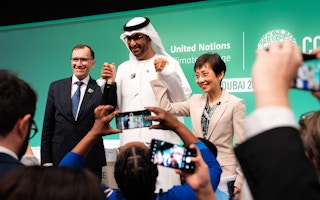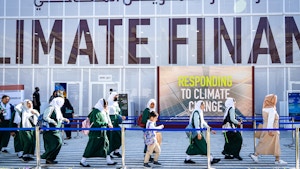High expectations have been set for the COP28 climate negotiations happening in Dubai as the second week kicked off with COP28 president Sultan Al Jaber declaring at a media briefing on Friday that “something unprecedented and momentous… would happen here”.
When pressed by the media on whether targets to cut oil, coal and gas — fossil fuels responsible for climate-warming emissions — will be seen in the final COP28 text, Al Jaber’s response was a guarantee that he “will continue to stay laser focused on the 1.5 degree Celsius target”.
He was referring to the Paris Agreement target of limiting global warming to 1.5°C above pre-industrial levels.
To continue reading, just sign up – it’s free!
- Get the latest news, jobs, events and more with our Weekly Newsletter delivered to you free.
- Access the largest repository of news and views on sustainability topics.
- You can publish your jobs, events, press releases and research reports here too!
Newsletter subscribers do not necessarily have a website account. Please sign up for free to continue reading!
“One thing I repeatedly say is that… the decline of fossil fuels is going to happen,” he told a densely-packed room at the ministerial press conference held at Expo City Dubai, adding “we have always been practical, realistic pragmatic and results driven”.
“We have been able to mobilise over US$83 billion in pledges, commitments and investments, and to catalyse action across energy, nature and finance,” he said.
When asked about how he intends to engage large countries like China, Russia and Saudi Arabia who have taken a strong stance even against “phasing down” fossil fuels, Al Jaber said again: “I can assure you that I have been engaging with everyone… including all relevant stakeholders.”
“I did not leave any stone unturned… I certainly hope that the parties will agree and present a recommendation to the presidency on language on the scope on fossil fuels that includes renewable energy and energy efficiency,” he said.
In keeping with a long-standing tradition of the United Nations climate conference, the president invited pairs of ministers, whom this year started much earlier six months ago, to lead consultations on outstanding issues at COP that will benefit from political guidance.
At the half-time press briefing, he convened the eight ministers who are presiding over discussions across key topics, including the global stocktake, mitigation, adaptation and means of implementation. He said the ministers will play an important role in identifying challenges in the negotiations and work with all parties to bridge diverging views.
Making reference to an open letter earlier signed by over 800 signatories from across business, finance, philanthropy, politics, academia and civil society on all Parties to deliver a 1.5 degree Celsius-aligned outcome in response to the global stocktake, Al Jaber urged all parties “to come together” to provide a global solution.
Ministers at the briefing struck a note of optimism, with one minister calling the Dubai meeting “the most important since the Paris Agreement”.
“As someone who has participated in this process since COP1 in Berlin in 1995, I can’t recall a COP where on the first day, we agreed on such a momentous agreement like we did on loss and damage,” said Steven Guilbeault, environment and climate change minister of Canada.
“
I did not leave any stone unturned… I certainly hope that the parties will agree and present a recommendation to the presidency on language on the scope on fossil fuels that includes renewable energy and energy efficiency.
Sultan Al Jaber, COP28 president
These are four areas of discussions that the eight ministers will guide at COP28:
On the global stocktake
Chaired by Barbara Creecy, minister of environment, forestry & fisheries of South Africa and Dan Jørgensen, minister for development, cooperation and global climate policy of Denmark, the focus of this negotiation stream will be to set up a mechanism built on science and equity.
“When we speak about science, we are talking about how the urgency is conveyed by reflecting on the best available scientific outcomes enshrined in the sixth IPCC assessment report and how we will manage to convey this urgency in the outcomes of the global stocktake on equity,” said Creecy.
Both ministers said a third draft of the text will be circulated shortly and called on parties “not to negotiate with nature”.
“No argument, no political or economic reason will stop the temperature from increasing,” added Jørgensen.
On mitigation
Chaired by Grace Fu, minister for sustainability and the environment of Singapore and Espen Barth-Eide, minister of climate and the environment of Norway, the mitigation track will keep the 1.5°C target in sight. Both ministers described it as their “North Star”.
“Over the past months, we have been engaging parties… which have helped us gain a better understanding of the parties’ aspirations and concerns about a successful COP28 outcome,” said Fu, who added that they will continue consulting over the next few days and co-facilitate a high-level ministerial round on the topic tomorrow.
Barth-Eide emphasised that the issue of mitigation “is also central to the work of adaptation, means of implementation, as well as loss and damage.
“If you really care about adaptation, you should also care about mitigation because the lower the temperature at home, the less there is to adapt to… If we exceed 1.5°C, we will be in a very, very different and very dangerous world,” he warned.
He said there were some points of convergence around the need for enhanced ambition and better implementation of and progress made on the methane pledges, but that there were also “many issues where parties do not agree “ for example on how to build on the decision from the Glasgow Climate Pact and also how to respond to the IPCC’s sixth assessment report.
“We will have honest discussions with the parties to identify new mitigation opportunities… but we are not here today to negotiate with physics, nature and chemistry because these are givens and the physical world does not react to statements but to actions,” he said.
On adaptation
Chaired by Maisa Rojas, minister for the environment of Chile and Jennifer McAllister, senator and assistant climate minister of Australia, this track focuses on the complex issue of common but differentiated responsibilities (CBDR), and the respective capabilities of countries.
Referencing Australia, McAllister noted that the country is “keenly understanding the effects of droughts, storms, bush fires and floods” and that every tenth of a degree of warming makes the adaptation tasks harder”.
She emphasised that “adaptation is really lagging behind” and that there is “inadequate investment and planning on climate adaptation that is leaving our world exposed”.
Both ministers said they were working with the Subsidiary Body for Implementation (SBI) chairs on technical consultations to closely coordinate a good outcome for an adaptation framework.
“
We are not here today to negotiate with physics, nature and chemistry because these are givens and the physical world does not react to statements but to actions.
Espen Barth-Eide, minister of climate and the environment, Norway
On means of implementation
Chaired by Yasmin Fouad, minister of environment of Egypt and Steven Guilbeault, minister of environment and climate change of Canada, this track will focus on financing technology transfer and capacity development because these topics come “as a package” and have to be run together in order to push the agenda forward, said the ministers.
The ministers emphasised that finance needs to be channelled towards the gaps that the world is seeing.
Al Jaber also added that this financing “must be made accessible and affordable” and highlighted the need for countries to create mechanisms “that allow for money that is easy to tap”. This would ensure the delivery of much-needed capital on a timely basis.
COP28, which started on 30 November and due to end on 12 December, is the biggest climate conference ever held with some reported 97,000 government officials, diplomats, observers, journalists and campaigners registered for the meeting.





















